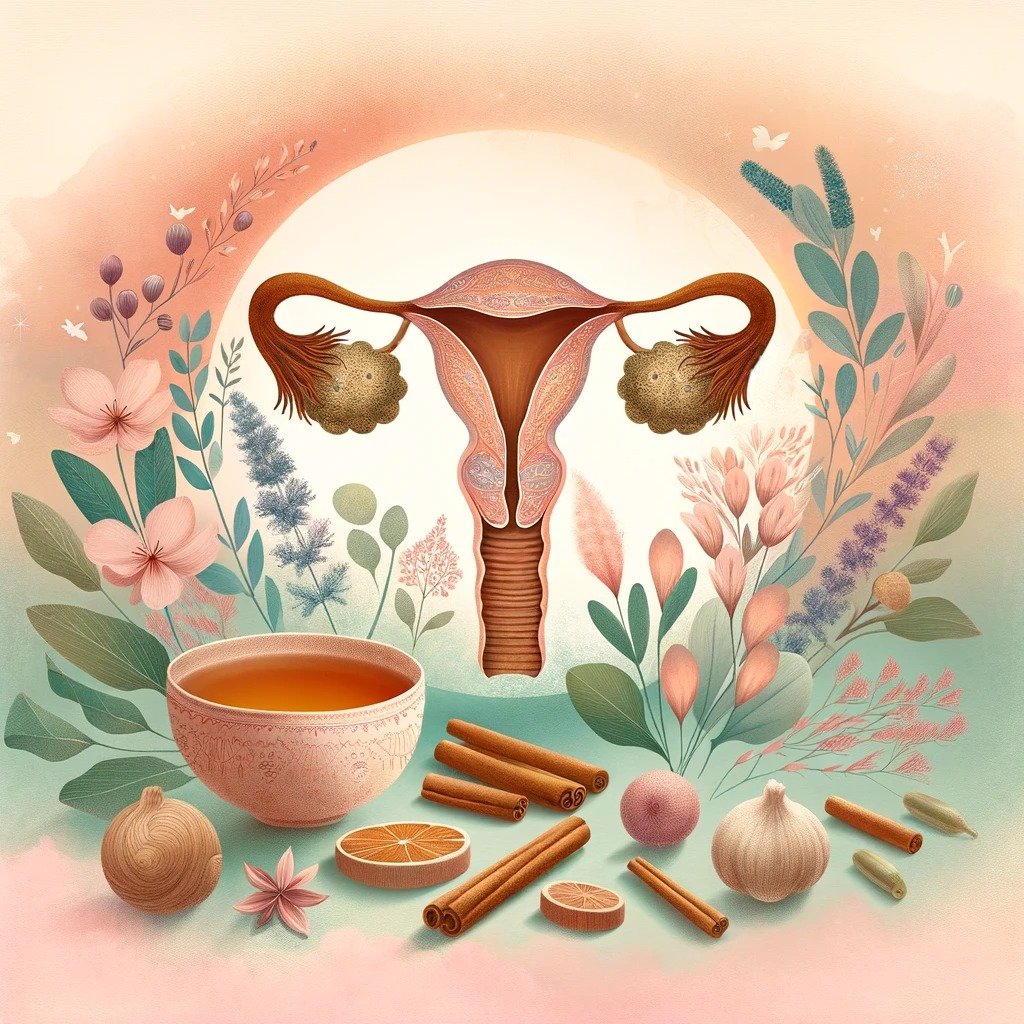Polycystic Ovary Syndrome (PCOS) is a common hormonal disorder that affects people with ovaries, particularly during their reproductive years. It is characterized by a combination of symptoms, including irregular menstrual cycles, ovarian cysts, and elevated levels of androgens (male hormones) such as testosterone. PCOS can lead to various complications, including infertility, weight gain, insulin resistance, and increased risk of type 2 diabetes and heart disease.
Despite its prevalence and significant impact on women’s health, managing PCOS can be challenging. Conventional treatments often focus on symptom management, such as regulating menstrual cycles and addressing fertility issues. However, many individuals with PCOS seek alternative or complementary approaches to alleviate their symptoms and improve their quality of life.
One such natural remedy that has gained attention in recent years is cinnamon. Cinnamon, derived from the inner bark of several trees from the genus Cinnamomum, has been used for centuries in traditional medicine for its various health benefits. In the context of PCOS, cinnamon has emerged as a potential ally in managing symptoms and promoting overall well-being.
While cinnamon is not a cure for PCOS, emerging research suggests that it may offer several benefits for individuals with this condition. From improving insulin sensitivity to regulating menstrual cycles and reducing inflammation, cinnamon’s therapeutic properties make it a promising addition to PCOS management strategies.
In this article, we will explore the potential benefits of cinnamon for individuals with PCOS. We will delve into the scientific evidence supporting its use, examine different ways to incorporate cinnamon into one’s diet or daily routine and discuss how cinnamon may help alleviate specific symptoms associated with PCOS. By understanding the role of cinnamon in PCOS management, individuals affected by this condition can make informed decisions about their health and explore natural remedies that complement existing treatments.
Understanding PCOS
Polycystic Ovary Syndrome (PCOS) is a complex hormonal disorder that affects people with ovaries, typically during their reproductive years. It is characterized by a combination of symptoms that can vary in severity and presentation among individuals. Understanding the symptoms and challenges associated with PCOS is crucial for effective management and improved quality of life for those affected.
Explanation of PCOS Symptoms and Their Impact on Women’s Health
PCOS manifests through a constellation of symptoms, including:
- Irregular Menstrual Cycles: Women with PCOS often experience irregular periods, which may include missed periods or prolonged cycles. This irregularity is due to hormonal imbalances, particularly elevated levels of androgens (male hormones) like testosterone, and disruptions in ovulation.
- Ovarian Cysts: Follicles in the ovaries may fail to mature properly, leading to the formation of small, fluid-filled sacs known as cysts. These cysts are a hallmark feature of PCOS and can contribute to infertility and hormonal disturbances.
- Hyperandrogenism: Elevated levels of androgens can cause symptoms such as acne, hirsutism (excessive hair growth, particularly on the face, chest, and back), and male-pattern baldness or thinning of hair.
- Insulin Resistance: Many individuals with PCOS also have insulin resistance, a condition where the body’s cells become less responsive to the effects of insulin. This can lead to high blood sugar levels, weight gain, and an increased risk of type 2 diabetes.
- Metabolic Issues: PCOS is associated with metabolic disturbances, including dyslipidemia (abnormal lipid levels) and obesity. These metabolic issues can further exacerbate the risk of cardiovascular disease and other long-term health complications.
The impact of PCOS on women’s health extends beyond physical symptoms, affecting emotional well-being, self-esteem, and fertility. Many individuals with PCOS experience psychological distress, anxiety, and depression, particularly due to challenges related to fertility, body image, and managing symptoms.

Statistics or Prevalence of PCOS Globally
PCOS is one of the most common endocrine disorders affecting people with ovaries worldwide. While estimates vary depending on diagnostic criteria and population demographics, PCOS is believed to affect approximately 5% to 10% of women of reproductive age.
Challenges in Managing PCOS with Conventional Treatments
Despite its prevalence, managing PCOS can be complex and challenging. Conventional treatment approaches often focus on addressing individual symptoms rather than targeting the underlying hormonal imbalances and metabolic issues associated with the condition. Challenges in managing PCOS with conventional treatments include:
- Limited Treatment Options: Conventional treatments for PCOS primarily include hormonal contraceptives to regulate menstrual cycles, anti-androgen medications to address symptoms like acne and hirsutism, and insulin-sensitizing drugs to manage insulin resistance. However, these treatments may not be effective for all individuals and may not address the underlying causes of PCOS.
- Side Effects: Some medications used to manage PCOS symptoms can cause side effects such as weight gain, mood changes, and decreased libido, leading to reduced treatment adherence and quality of life for affected individuals.
- Fertility Challenges: PCOS is a leading cause of infertility in women due to irregular ovulation and hormonal imbalances. Fertility treatments, such as ovulation induction medications or assisted reproductive technologies like in vitro fertilization (IVF), may be necessary for individuals with PCOS who are trying to conceive.
- Long-Term Health Risks: PCOS is associated with an increased risk of developing type 2 diabetes, cardiovascular disease, and endometrial cancer later in life. Managing these long-term health risks requires comprehensive care, including lifestyle modifications, regular monitoring, and preventive measures.
Overall, addressing the complexities of PCOS requires a multidisciplinary approach that considers the diverse symptoms, underlying hormonal imbalances, and individual needs of affected individuals. Integrating lifestyle modifications, dietary changes, and complementary therapies alongside conventional treatments can help optimize outcomes and improve the overall well-being of those living with PCOS.
The Role of Cinnamon in PCOS Management
Introduction to Cinnamon and its Historical Use in Traditional Medicine
Cinnamon, derived from the inner bark of trees belonging to the Cinnamomum genus, has a rich history of use in traditional medicine across various cultures. Its aromatic flavor and medicinal properties have made it a prized spice for centuries. In traditional Chinese medicine and Ayurveda, cinnamon has been used to treat a wide range of ailments, including gastrointestinal issues, respiratory conditions, and inflammatory disorders.
Explanation of How Cinnamon May Benefit Women with PCOS
In the context of PCOS management, cinnamon has garnered attention for its potential to address several key aspects of the condition:
- Insulin Sensitivity: One of the hallmark features of PCOS is insulin resistance, a condition where cells become less responsive to the effects of insulin, leading to elevated blood sugar levels. Cinnamon has been shown to improve insulin sensitivity by enhancing insulin signaling pathways and increasing glucose uptake by cells. This can help regulate blood sugar levels and reduce the risk of developing type 2 diabetes, a common comorbidity of PCOS.
- Menstrual Cycle Regulation: Women with PCOS often experience irregular menstrual cycles due to hormonal imbalances and disruptions in ovulation. Cinnamon may help regulate menstrual cycles by exerting a modulating effect on reproductive hormones, such as luteinizing hormone (LH) and follicle-stimulating hormone (FSH). By promoting more regular ovulation, cinnamon can help improve fertility and menstrual cycle regularity in women with PCOS.
- Androgen Reduction: Elevated levels of androgens, such as testosterone, contribute to symptoms like acne, hirsutism (excessive hair growth), and male-pattern baldness in women with PCOS. Cinnamon has been found to have anti-androgenic properties, meaning it may help lower androgen levels and mitigate these symptoms.
- Anti-inflammatory Effects: Chronic low-grade inflammation is a common feature of PCOS and is associated with insulin resistance, hormonal imbalances, and metabolic disturbances. Cinnamon contains bioactive compounds, such as cinnamaldehyde and cinnamic acid, which exhibit potent anti-inflammatory properties. By reducing inflammation, cinnamon may alleviate symptoms and improve overall health outcomes in women with PCOS.

Overview of Scientific Studies Supporting the Effectiveness of Cinnamon for PCOS Management
Numerous scientific studies have investigated the potential therapeutic effects of cinnamon in the management of PCOS. These studies have yielded promising results, demonstrating the following benefits:
- Improved Insulin Sensitivity: Clinical trials have shown that supplementation with cinnamon can lead to improvements in insulin sensitivity and glucose metabolism in women with PCOS. These effects may help lower fasting blood sugar levels, reduce insulin resistance, and improve overall metabolic health.
- Regulation of Menstrual Cycles: Research suggests that cinnamon supplementation may help restore menstrual cycle regularity and promote ovulation in women with PCOS. By balancing reproductive hormones and supporting ovarian function, cinnamon may enhance fertility and increase the likelihood of conception.
- Reduction of Androgen Levels: Some studies have indicated that cinnamon supplementation can lead to reductions in circulating androgen levels, such as testosterone and free testosterone, in women with PCOS. This may translate to improvements in symptoms like acne, hirsutism, and hair loss.
- Anti-inflammatory Effects: Preclinical and clinical studies have demonstrated the anti-inflammatory properties of cinnamon and its potential to reduce markers of inflammation in women with PCOS. By dampening inflammatory pathways, cinnamon may help alleviate symptoms and reduce the risk of long-term complications associated with PCOS.
Overall, while more research is needed to fully elucidate the mechanisms of action and optimal dosing strategies for cinnamon in PCOS management, existing evidence suggests that cinnamon may offer significant therapeutic benefits for women with this condition. Integrating cinnamon into dietary and lifestyle interventions alongside conventional treatments may help improve outcomes and enhance quality of life for individuals living with PCOS.

Ways to Consume Cinnamon
Drinking Cinnamon Tea
Cinnamon Tea Recipe:
- Boil 1 cup of water in a saucepan.
- Add 1 cinnamon stick or 1 teaspoon of ground cinnamon to the boiling water.
- Allow the cinnamon to steep for 10-15 minutes.
- Strain the tea into a cup and enjoy. Optionally, you can add a slice of lemon or a drizzle of honey for added flavor.
Benefits of Cinnamon Tea for PCOS:
- Blood Sugar Regulation: Cinnamon tea can help improve insulin sensitivity and regulate blood sugar levels, which is beneficial for individuals with PCOS who may have insulin resistance.
- Anti-inflammatory Effects: The anti-inflammatory properties of cinnamon may help reduce inflammation associated with PCOS and alleviate symptoms such as acne and menstrual irregularities.
- Improved Digestion: Cinnamon tea can aid in digestion and alleviate gastrointestinal discomfort, which is often experienced by individuals with PCOS due to hormonal imbalances.
Adding Cinnamon to Foods
Examples of Dishes Where Cinnamon Can Be Incorporated:
- Oatmeal: Sprinkle ground cinnamon over a bowl of oatmeal for added flavor and health benefits.
- Yogurt: Mix cinnamon into plain yogurt and top with fruits and nuts for a nutritious and satisfying snack or breakfast option.
- Smoothies: Add a dash of cinnamon to your favorite smoothie recipe for a flavorful boost and additional health benefits.
Benefits of Consuming Cinnamon in Food for PCOS:
- Dietary Diversity: Incorporating cinnamon into various foods allows for a diverse and enjoyable diet, which is essential for overall health and well-being.
- Stable Blood Sugar Levels: Consuming cinnamon with meals can help stabilize blood sugar levels and reduce the risk of insulin spikes, which is beneficial for managing PCOS symptoms.
- Nutrient Boost: Cinnamon is rich in antioxidants and nutrients that support overall health, including manganese, calcium, and fiber, making it a valuable addition to any diet.
Cinnamon Supplements
Types of Cinnamon Supplements Available:
- Capsules: Cinnamon supplements are available in capsule form, containing concentrated doses of cinnamon extract or powder.
- Powder: Cinnamon powder can be purchased as a standalone supplement or as part of a blend with other herbs and nutrients.
Dosage Recommendations for PCOS Management:
- The optimal dosage of cinnamon supplements for PCOS management may vary depending on individual factors such as age, weight, and overall health.
- It is recommended to start with a low dose and gradually increase as tolerated, following the instructions provided on the supplement packaging or consulting with a healthcare professional for personalized guidance.
Benefits and Considerations of Cinnamon Supplements for PCOS:
- Convenience: Cinnamon supplements offer a convenient and portable way to incorporate cinnamon into one’s daily routine, especially for individuals who may not enjoy the taste of cinnamon or have difficulty consuming it in food form.
- Standardized Formulas: Some cinnamon supplements are standardized to contain specific amounts of active compounds, such as cinnamaldehyde, ensuring consistency and potency.
- Potential Interactions: It is important to be aware of potential interactions between cinnamon supplements and medications, particularly for individuals with underlying health conditions or those taking prescription medications. Consulting with a healthcare professional before starting any new supplement regimen is recommended to minimize the risk of adverse effects.

Benefits of Cinnamon for PCOS
Regulation of Insulin Levels
Explanation of How Cinnamon Helps Regulate Insulin Sensitivity:
- Cinnamon contains bioactive compounds, such as cinnamaldehyde, which have been shown to improve insulin sensitivity by enhancing insulin signaling pathways and increasing glucose uptake by cells.
- Additionally, cinnamon may inhibit enzymes involved in glucose metabolism, leading to lower blood sugar levels and reduced insulin resistance.
Importance of Insulin Regulation in Managing PCOS Symptoms:
- Insulin resistance is a key feature of PCOS and is closely associated with metabolic disturbances, weight gain, and irregular menstrual cycles.
- By improving insulin sensitivity, cinnamon can help regulate blood sugar levels, reduce hyperinsulinemia (high insulin levels), and mitigate symptoms such as weight gain, acne, and irregular periods.
Improved Menstrual Cycle Regularity
Research Findings on the Effects of Cinnamon on Menstrual Cycle Regularity in Women with PCOS:
- Several studies have investigated the effects of cinnamon supplementation on menstrual cycle regularity in women with PCOS, with promising results.
- Research suggests that cinnamon may help restore ovulatory function and promote more regular menstrual cycles by modulating reproductive hormones such as luteinizing hormone (LH) and follicle-stimulating hormone (FSH).
Real-life Testimonials or Case Studies Illustrating Improvements in Menstrual Cycle Regularity with Cinnamon Consumption:
- Many individuals with PCOS have reported improvements in menstrual cycle regularity and ovulation after incorporating cinnamon into their diet or supplementation regimen.
- Personal anecdotes and case studies highlight the potential benefits of cinnamon in restoring fertility and promoting reproductive health in women with PCOS.
Reduction of Androgen Levels
Discussion on How Cinnamon May Lower Androgen Levels in Women with PCOS:
- Elevated androgen levels, such as testosterone, contribute to symptoms like acne, hirsutism (excessive hair growth), and male-pattern baldness in women with PCOS.
- Cinnamon has been found to have anti-androgenic properties, which may help lower circulating androgen levels and mitigate these symptoms.
Benefits of Reduced Androgen Levels, Such as Improvement in Acne and Hirsutism:
- Lowering androgen levels can lead to improvements in symptoms such as acne, oily skin, and hirsutism, thereby improving the overall appearance and quality of life for individuals with PCOS.
- By addressing the underlying hormonal imbalances, cinnamon may help alleviate physical and emotional distress associated with excess androgens in women with PCOS.
Management of PCOS-related Inflammation
Explanation of Cinnamon’s Anti-inflammatory Properties:
- Cinnamon contains potent antioxidants and anti-inflammatory compounds, such as cinnamaldehyde and cinnamic acid, which help reduce inflammation and oxidative stress in the body.
- Chronic low-grade inflammation is a common feature of PCOS and is associated with insulin resistance, hormonal imbalances, and metabolic disturbances.
Importance of Managing Inflammation in PCOS to Reduce Symptoms and Long-term Health Risks:
- By reducing inflammation, cinnamon may help alleviate symptoms such as abdominal discomfort, bloating, and fatigue commonly experienced by individuals with PCOS.
- Managing inflammation is crucial for mitigating long-term health risks associated with PCOS, including cardiovascular disease, type 2 diabetes, and reproductive complications.
Incorporating cinnamon into one’s diet or supplementation regimen may offer multiple benefits for individuals with PCOS, including improved insulin sensitivity, menstrual cycle regularity, androgen reduction, and inflammation management. While more research is needed to fully elucidate the mechanisms of action and optimal dosing strategies, existing evidence suggests that cinnamon holds promise as a natural adjunct therapy for PCOS management.
Conclusion
Recap of the Benefits of Cinnamon for PCOS Management
In conclusion, cinnamon holds significant promise as a natural remedy for managing Polycystic Ovary Syndrome (PCOS). Through its various therapeutic properties, including regulation of insulin levels, improvement in menstrual cycle regularity, reduction of androgen levels, and management of PCOS-related inflammation, cinnamon offers multifaceted benefits for individuals affected by this complex hormonal disorder. From stabilizing blood sugar levels to promoting ovulatory function and alleviating symptoms such as acne and hirsutism, cinnamon emerges as a valuable adjunct therapy in the comprehensive management of PCOS.
Encouragement for Women with PCOS to Consider Incorporating Cinnamon into Their Daily Routines
For women living with PCOS, incorporating cinnamon into their daily routines may offer a simple yet effective way to support their health and well-being. Whether through the consumption of cinnamon tea, integration into various foods, or supplementation with cinnamon capsules or powder, there are numerous ways to reap the benefits of this versatile spice. By making cinnamon a regular part of their diet or supplementation regimen, women with PCOS can potentially experience improvements in symptoms, reproductive health, and overall quality of life.
Future Research Directions and Potential for Cinnamon as a Complementary Therapy for PCOS
While existing research on the therapeutic effects of cinnamon for PCOS is promising, further studies are needed to fully elucidate its mechanisms of action, optimal dosing strategies, and long-term efficacy and safety. Future research directions may include large-scale clinical trials to evaluate the effects of cinnamon supplementation on various aspects of PCOS, including hormonal balance, metabolic health, fertility outcomes, and quality of life. Additionally, exploring potential synergistic effects of cinnamon with other natural remedies or conventional treatments for PCOS could provide valuable insights into its role as a complementary therapy. By advancing our understanding of cinnamon’s therapeutic potential and integrating it into evidence-based management strategies for PCOS, we can empower women with this condition to take control of their health and achieve optimal outcomes.
FAQ: Cinnamon and PCOS Management
What is PCOS?
- Polycystic Ovary Syndrome (PCOS): A hormonal disorder affecting people with ovaries, especially during reproductive years. Symptoms include irregular menstrual cycles, ovarian cysts, high levels of androgens, insulin resistance, and potential complications like infertility and diabetes.
How common is PCOS?
- Prevalence: Affects approximately 5% to 10% of women of reproductive age worldwide, making it one of the most common endocrine disorders.
What are the challenges of managing PCOS?
- Management Challenges:
- Limited treatment options focusing on symptom management.
- Side effects of medications.
- Fertility issues.
- Increased risk of long-term health issues like diabetes and heart disease.
How can cinnamon help with PCOS?
- Benefits of Cinnamon:
- Insulin Sensitivity: Improves insulin sensitivity, reducing blood sugar levels.
- Menstrual Cycle Regulation: May help regulate menstrual cycles and promote ovulation.
- Androgen Reduction: Has potential anti-androgenic properties, reducing symptoms like acne and excessive hair growth.
- Anti-inflammatory Effects: Contains compounds with anti-inflammatory properties, addressing chronic inflammation associated with PCOS.
What research supports cinnamon’s effectiveness for PCOS?
- Scientific Evidence:
- Studies show cinnamon can improve insulin sensitivity, menstrual regularity, and reduce androgen levels.
- More research is needed for conclusive evidence and optimal dosing.
How can cinnamon be consumed?
- Ways to Consume:
- Cinnamon Tea: Drinking cinnamon tea may regulate blood sugar and reduce inflammation.
- Adding to Foods: Incorporating cinnamon into oatmeal, yogurt, or smoothies for flavor and health benefits.
- Supplements: Capsules or powder supplements for convenience and standardized dosages.
What are the dosing recommendations for cinnamon supplements?
- Dosage:
- Start with a low dose and adjust. Consult packaging or a healthcare professional for guidance.
- Be aware of potential interactions with medications.
What are the overall benefits of cinnamon for PCOS?
- Key Benefits:
- Regulation of insulin and blood sugar levels.
- Improved menstrual cycle regularity.
- Reduction of androgen levels.
- Management of inflammation.
Should individuals with PCOS consider cinnamon as a treatment option?
- Consideration for Use:
- Cinnamon can be a valuable addition to managing PCOS, alongside conventional treatments.
- Always consult with a healthcare professional before starting any new supplement or dietary change.
What future research is needed for cinnamon and PCOS?
- Future Research:
- Further studies to understand the full potential, optimal dosing, and long-term safety.
- Exploration of cinnamon in combination with other treatments for synergistic effects.
Incorporating cinnamon into the daily routine may provide several benefits for individuals with PCOS, potentially improving symptoms and quality of life. However, it’s important to approach this as part of a comprehensive management plan, including lifestyle changes and conventional treatments, under the guidance of healthcare professionals.

